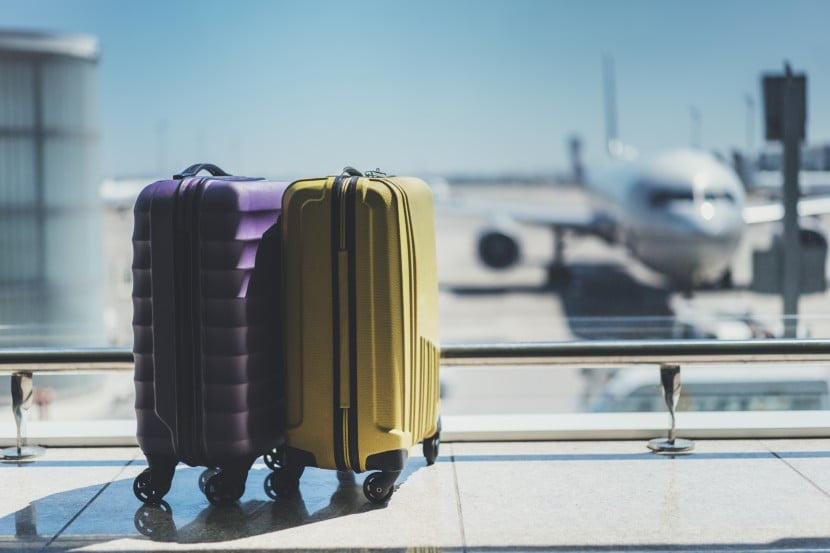The airport's calling - and we're already mentally packing.
But before you start rolling up your socks and squashing souvenirs into your suitcase, it's worth checking your baggage allowance. Go over it, and you could face sneaky, surprise charges.
Every airline has its own rules. So to save you a last-minute repack at the airport, we've pulled together a quick guide to popular limits - plus a few tips to help you stay within them.

What is baggage allowance?
Baggage allowance is just a fancy way of saying how much stuff you're allowed to bring on the plane. Think of it as your personal luggage limit set by your airline.
There's 2 main types:
Hand luggage
This is the stuff you bring into the cabin with you. Most airlines let you take 2 bags with you. This includes:
- A bag for the overhead locker (you'll need to be able to lift it yourself).
- A bag that fits under the seat in front of you, like a small backpack or handbag.
Hold luggage
This is the bigger bag that gets checked in and travels in the plane's cargo hold. Most airlines include one checked bag of up to 23kg as standard.
A few things to keep in mind:
- Packing heavy? Most airlines let you pay for extra weight or another bag if you need it.
- Check before you fly. Each airline has its own rules, so it's always worth double-checking to avoid any surprises at the airport.
Free baggage allowance by airline
| Airline | What's free? | Can you pay for extra baggage? | What if my luggage is overweight? |
|---|---|---|---|
|
Ryanair
|
You're allowed a 'small cabin bag' (40 x 20 x 25cm) per passengers that can fit under the seat in front of you.
|
Yes - you can pay for a priority seat with 2 cabin bags (from £7-£27). The extra bag can be a wheelie case of up to 10kg. You can also pay between £9.49-£44.99 for a 10kg bag to go in the hold. |
Overweight luggage is charged at £12 per kilogram. There's also a flat fee of between £40-£60 for larger, 20kg hold bags at the airport. |
|
easyJet
|
You're allowed 1 bag (45 x 36 x 20cm) up to 15kg.
|
Yes - you can buy an extra cabin bag (56 x 45 x 25cm) available on its own (£5.99) or included as part of a seat upgrade (from £7.99). You can also buy up to 3 hold bags up to 23kg each.
|
Any extra bags not already purchased will cost £40. Overweight luggage is charged at £12 per kg.
|
|
British Airways
|
You'll get 1 carry-on (40 x 30 x 15cm) up to 23kg and a checked bag (90 x 75 x 43cm) up to 23kg.
|
Yes - a 2nd checked-in bag starts from about £65, with any additional bags after that costing from £80-£140.
|
The flat fee is £65 per overweight bag.
Bags over 32kg won't be accepted as checked baggage. |
|
Jet2.com
|
You can take 1 piece of hand luggage (56 x 45 x 25cm) on board that must not be heavier than 10kg. You can also bring a small, personal item to go underneath your seat, like a laptop bag.
|
Yes - you can purchase up to 3 22kg checked bags from £8-£43. |
The flat fee for overweight baggage is £12 per kg.
|
|
Virgin Atlantic
|
You can take 1 piece of hand luggage (23 x 36 x 56cm). The maximum weight depends on your ticket class. Depending on your ticket class, you might be entitled to 1 checked bag (90 x 75 x 43cm) up to 23kg.
|
Yes - the 1st extra bags costs £50, the 2nd is £65 and 3 or more costs £140 each. The maximum amount of extra bags allowed is 10.
|
Oversized bags are charged at £200, and oversized luggage is charged at £65.
|
What happens if my luggage is overweight?
If your bag's over the weight limit, the airline might charge you an extra fee and they can add up quickly. Some charge by the kilo, others have flat rates depending on how far over you are.
In some cases, you might be able to shift a few things into your hand luggage if there's space. But if everything's maxed out, you'll likely have to pay up.
To avoid the drama, weigh your bags at home and, if you think you'll be pushing the limit, consider booking extra allowance online. It's usually cheaper than paying at the airport.
Tips for not going over your luggage weight
Nobody wants to be that person repacking their suitcase at the check-in desk. Here's how to avoid extra charges:
-
Know your limits - Every airline has different rules for luggage weight and size. So check the fine print in your booking info before you start packing.
-
Book extra baggage ahead of time - Think you'll be cutting it close? It's usually much cheaper to add extra allowance online before you travel, rather than getting stung at the check-in desk.
-
Buy an extra seat (yes, really) - Some airlines, like Ryanair, let you buy an extra seat for oversized items that don't play by the baggage rules - like musical instruments or wedding dresses. Handy!
-
Weigh as you go - A portable luggage scale can save you a lot of last minute stress. Pop it on your bag as you pack so you can stay one step ahead of the scales at the airport.
Are infants allowed luggage?
Short answer: it depends on your airline and the type of ticket you book for your little one.
If you've gone for a discounted infant fare, they'll usually be on your lap for the flight - and their baggage allowance might be limited. For example, Ryanair doesn't allow hand luggage for infants travelling on a parent's lap or in their own seat unless you buy a separate ticket.
Some airlines do offer a small allowance - often a 5kg baby bag (typically around 45 x 35 x 20cm). You can bring it alongside your own hand luggage.
If you've brought your child their own seat, they'll usually get the baggage allowance as an adult. But always double-check the airline's terms before you fly - every carrier does it a little differently.
Let's take a closer look:
| Airline | Can infants have luggage? | Restrictions |
|---|---|---|
|
Ryanair
|
Yes
|
There's no cabin baggage allowance for infants sitting on an adult’s lap, but they're allowed a bag of up to 5kg (45 x 30 x 25cm) for essential items.
|
|
easyJet
|
Yes
|
Infants and children over 2 years old with booked seats have the same cabin bag and hold luggage allowance as adults. If your infant is seated on your lap, you can only take an additional baby changing bag (max. 45 x 36 x 20 cm).
|
|
British Airways
|
Yes
|
Infants under 2 years of age who have a plane seat booked are given the same baggage allowance as adults. If they don't have their own seat, an extra bag for in-flight essentials is allowed.
|
|
Jet2.com
|
No
|
Only children over the age of 2 have baggage allowance.
|
|
Virgin Atlantic
|
Yes
|
Children and seated infants get the same baggage allowance as adults.
|
Some airlines might let you take a pushchair and 1 other item, like a booster seat or travel cot. Sometimes this is free of charge but it’s always worth double-checking.
If you get a family travel insurance policy, your infant's baggage should be covered if their luggage gets lost, stolen or damaged.
What can you take in hand luggage?
Liquid rules at UK airports are in a bit of a transition right now. New 3D scanners are being introduced, and once they're everywhere, the rules around liquids will relax. But we're not quite there yet.
Right now, the 100ml rule still applies at most airports - so it's safest to pack like normal, just to avoid any stress at security.
That means any liquids in your hand luggage need to be in containers of 100ml or less, all packed into a clear, resealable plastic bag (20 x 20cm). You're allowed one of these bags per person, and you'll need to take it out at security.
Liquids include more than just drinks: think toothpaste, face cream, contact lens solution... basically, anything gloopy, creamy or splashy. There's a full list on GOV.UK if you want to double-check.
A few rules to the 100ml rule do exist. For example, if you're carrying liquids for medical needs, special diets or for your baby. Just be ready to explain them at security.
And, what about duty-free goodies? If you've bought liquids after security - like perfume or a bottle of something nice - you should be able to take them on board with no issues. Just keep your receipt and make sure they stay inside the bag the shop gives you.
One more thing - just because your departure airport might have new scanners and updated rules, your arrival airport might not. Until the scanners are rolled out everywhere, stick to the usual liquid rules. It'll save you any hassle (and potentially a bin full of toiletries) at the airport.
Is my baggage covered under my travel insurance?
Most of the time, yes!
Travel insurance usually includes baggage cover as standard. So if your luggage goes missing, gets stolen or comes back looking worse for wear, you should be able to claim for it.
If it's the airlines fault - say, your cabin bag gets damaged - they might cover the basics, like:
- Toiletries and other essentials
- Cash toward replacing your bag
But be warned - airline payouts tend to be on the stingy side. Travel insurance usually offers far broader cover and a much smoother claims process.
Just don't skip the small print. Some travel insurance policies limit how much you can claim per item (often £200-£300) and most have an excess, usually up to £80.
Oh, and it's not just baggage you're covered for. Travel insurance can also step in if:
-
Your luggage is lost or stolen
-
Weather messes with your flights
-
Your airline goes bust
So, while we can't promise your bag won't take a detour - we can help make sure you're not left out of pocket if it does.
Compare travel insurance

